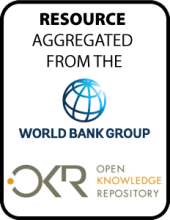Land Library
Welcome to the Land Portal Library. Explore our vast collection of open-access resources (over 74,000) including reports, journal articles, research papers, peer-reviewed publications, legal documents, videos and much more.
/ library resources
Showing items 1 through 9 of 623.Section one of this report opens with a brief environmental history of Haiti, followed by an analysis of the current state of environmental conditions, and closes with an examination of contemporary human and landscape vulnerabilities to acute and chronic environmental degradation and extreme cli
Landfill gas (LFG) management can help mitigate greenhouse gas emissions and contribute to the overall safe operation of a landfill, sometimes simultaneously generating revenue. However, financing these systems can be a challenge, particularly in low-resource settings.
Agriculture, and the patterns of land-use change that are associated with it, have a significant ecological footprint, including the effects it has on climate change, accounting for about one-quarter of anthropogenic greenhouse gas (GHG) emissions globally.
The new Country Partnership Framework
(CPF or framework) presents the engagement of the World Bank
Group (WBG) in Sri Lanka over the next four years (fiscal
years 2017-20 (FY17–20)). The CPF aims to support the
Although many studies consider the
spatial pattern of manufacturing plants in developing
countries, the role of services as a driver of urbanization
and structural transformation is still not well understood.
Improving the productivity of
smallholder farms in Sub-Saharan Africa offers the best
chance to reduce poverty among this generation of rural
poor, by building on the limited resources farming
This Systematic Country Diagnostic (SCD) is designed to assess the key constraints and opportunities facing Mozambique as it strives to sustain robust growth and macroeconomic stability while accelerating poverty reduction and promoting greater economic inclusiveness.
Cameroon is a lower-middle income country with social indicators and levels of poverty which are below those for comparator countries. Large and rising inequalities between north and south, inefficiencies in public resource allocation and an adverse business environment explain this.
Groundwater is a vital yet threatened
resource in much of South Asia. This paper develops a model
of groundwater transactions under payoff uncertainty arising
from unpredictable fluctuations in groundwater availability






